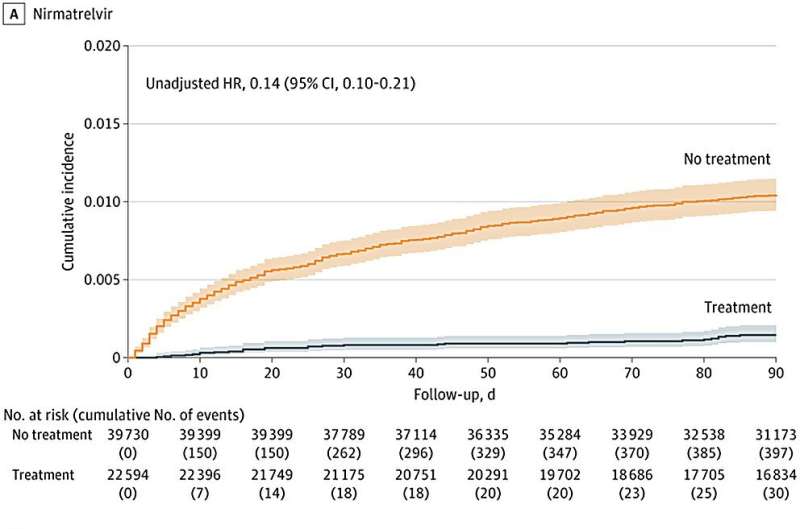This article has been reviewed according to Science X's editorial process and policies. Editors have highlighted the following attributes while ensuring the content's credibility:
fact-checked
peer-reviewed publication
trusted source
proofread
Research finds Paxlovid and Legevrio reduced COVID-19 hospitalization and death

New Cleveland Clinic-led research shows commonly used COVID-19 anti-viral drugs Paxlovid (nirmatrelvir) and Lagevrio (molnupiravir) reduce risk of hospitalization and death in high-risk patients with mild disease, even with omicron subvariants.
The observational study, published in JAMA Network Open, analyzed nearly 70,000 patients diagnosed with COVID-19 at Cleveland Clinic between April 2022 to February 2023.
It found that nirmatrelvir lowered risk of death by 84% and molnupiravir by 77% compared to no treatment. Both drugs also reduced combined risk of hospitalization and death by over 40%. Importantly, the treatments were effective across all patient subgroups and against newer strains like BQ.1.1 and XBB.1.5.
Both medications work by stopping the virus from replicating in the body. This reduces the chances of a patient getting more serious symptoms and being hospitalized. There are some restrictions for taking these oral antivirals, including potential interactions with other medications.
"Our research highlights the importance of utilizing observational studies to assess the efficacy of COVID-19 treatments based on real-world evidence," said Xiaofeng Wang, Ph.D., of Cleveland Clinic's Lerner Research Institute and senior author of the paper. "The findings regarding the effectiveness of Lagevrio are especially crucial due to notable Paxlovid drug-drug interactions."
The real-world data confirms nirmatrelvir and molnupiravir remain go-to treatments for vulnerable COVID-19 patients, despite the virus continuing to mutate.
The findings, conducted in collaboration with University of North Carolina, support continued use of these oral antivirals to prevent severe outcomes in non-hospitalized patients at high risk of progressing to severe COVID-19. The outcomes were observed consistently across subgroups defined by age, race and ethnicity, date of COVID-19 diagnosis, vaccination status, previous infection status, and coexisting conditions.
"The results of this study also underscore the importance of continuing to test for COVID-19, especially for those who are high risk because we have effective treatments available," said Abhijit Duggal, M.D., Director of Critical Care Clinical Research at Cleveland Clinic and an author on the paper. "If you test positive for COVID-19, talk to your doctor about your treatment options."
To be effective, the medications must be taken within five days of the onset of symptoms.
The study results come as the country is gearing up for respiratory virus season. Preventive measures such as vaccination, practicing good hand hygiene, staying home when sick and wearing masks in certain situations can help reduce the spread of not only COVID-19, but other viral illnesses such as influenza and RSV.
More information: Dan-Yu Lin et al, Nirmatrelvir or Molnupiravir Use and Severe Outcomes From Omicron Infections, JAMA Network Open (2023). DOI: 10.1001/jamanetworkopen.2023.35077



















